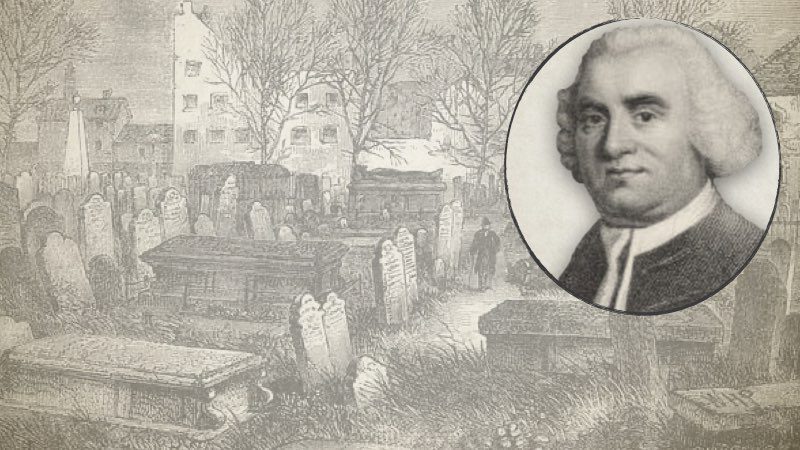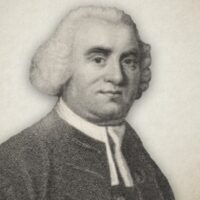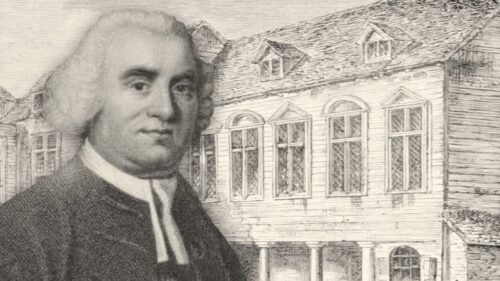
The Life And Death Of John MacGowan
J. A. Jones, “Bunhill Memorials”:
John MacGowan, Bapt. Here lies John MacGowan, U. D. M. who at the hand of God merited nothing but final destruction, yet, through grace, was enabled to hope in a finished salvation. He died Nov. 25, 1780, aged 54 years.
“For by grace are ye saved, through faith, and that not of yourselves, it is the gift of God.” Eph. 2:8.
Head Stone, E. and W. 79,—N. and S. 33, 34.
John MacGowan was born in Edinburgh about the year 1726. But little information can be obtained respecting his early life. After receiving a common school education, he was placed out to the trade of a weaver. In early life he connected himself with the Wesleyan Methodists, and became a preacher among them. Embracing the Calvinistic system, he joined the Independents, and at length the particular Baptists. For some years he was settled with the Baptist Church at Bridgenorth, in Shropshire. At length discouraged by the want of success, he was desirous of leaving; and this being known, led the Baptist Church at Devonshire Square, London, to give him an invitation; and his ministry being acceptable, he received an invitation to the pastoral office. He was received by them into communion, Dec. 15, 1766, and was set apart over the church, July 29,1767; Drs. Gill and Stennett, and Mr. Wallin, and Mr. Borford, united in his Ordination. In this connection Mr. MacGowan continued nearly fifteen years, till he was removed by death, Nov. 25, 1780, in the fifty-fifth year of his age. Mr. Benjamin Wallin preached and published his funeral sermon, in which he speaks very highly of his deceased brother. It is founded on Zech. 3:2: “Is not this a brand pinched out of the fire?” This text was chosen by Mr. MacGowan.
Mr. Reynolds, pastor of the Baptist Church at Cripplegate, has given us a vivid description of the blessed frame of his mind during his last illness. He says,
“Mr. MacGowan was one of the most valuable Christian companions I ever had the honour of an intimacy with. He was the amiable Christian, the sincere friend, and the faithful gospel minister. No one more sensibly felt the loss of him than myself. I frequently visited him, when he took occasion, as opportunity offered, of opening to me his whole heart.—At one time he was in great darkness of soul, and lamented exceedingly the withdrawings of God’s presence. Two things, he said, had deeply exercised his thoughts. One was, how those heavy and complicated afflictions which God had seen fit to lay upon him, could work, so as to promote his real good; and the other, that God, his best friend, should keep at a distance from his soul, when the Lord knew how much his mind was distressed for the light of his countenance. ‘O!’ said he, turning to me and speaking with great earnestness, ‘O my soul panteth for God, for the living God; his love-visits would cheer my soul, and make this heavy affliction sit light upon me. The presence of Jesus, my Redeemer, I cannot do without—I trust he will return to me soon—yea, I know he will, in his own time; for he knows how much I need the influence of his grace.’—In this conversation he mentioned the depravity of his nature, and what a burden he found it:—‘My heart,’ said he, ‘is more and more vile—every day I have such humiliating views of heart-corruption, as weigh me down,—I wonder whether any of the Lord’s people see things in the same light I do.’ And then turning to me, he said, ‘And do you find it so, my brother?’ Upon my answering him in the affirmative, he replied, “I am glad of that.’’
“The next time, which was the last of my conversing with him, I found him in a sweet and heavenly frame; his very countenance indicated the serenity of his mind. On my entering the room he exclaimed, “O my dear brother, how rejoiced I am to see you!—sit down and hear the lovingkindness of my God. You see me as ill as I can be in this world, and as well as I can be whilst in the body. Methinks I have as much of heaven as I can hold!”—The tears of joy, like a river, flowed from his eyes; and his inward pleasurable frame interrupted his speech for a time. He broke silence with saying—“The work will soon be over—you see what you also must soon experience. But death, to me, has nothing terrific in it;—I have not an anxious thought;—the will of God, and my will are one; ’tis all right, yet mysterious.—We are to part here; but, we shall meet again!—You cannot conceive the pleasure I feel [in this reflection, viz., that I have not shunned to declare (according to my light and ability) the whole counsel of God;—I can die on the Doctrines which I have preached;—they are true,—I find them so.—Go on to preach the Gospel of Christ, and mind not what the world may say of you!’—All the while I sat silent; and rising up to take my leave, fearing he would spend his strength too much, he immediately took me by the hand, and weeping over each other, we wished mutual blessings. Upon parting he said, ‘My dear brother farewell—I shall see you no more.’—Thus (continues Mr.Reynolds) I left my much esteemed friend and brother; and the next news I heard of him was, that on the Saturday evening, his immortal spirit left the body, to go to the world of light and bliss, and keep an eternal Sabbath of rest, with God, angels and saints.”
Mr. MacGowan was well known in the world, and especially in the churches of the saints, both as a minister and an author. An ardent zeal for the Gospel of Christ, engaged all the powers of his mind. As a preacher, he was faithful, judicious, and affectionate. His humility was very remarkable. He experienced great conflicts in the discharge of his ministerial office, on account of an habitual sense of his sins and corruptions, which frequently overwhelmed his mind, when he appeared in public. He was always highly spoken of, and held in great esteem by his brethren in the ministry.
His several publications are standing proofs of his great abilities, and singular talents. His “Death a Vision,” is an invaluable treasure. The “Shaver, or Priestcraft defended,” as laying open the evils of Priestcraft in our Universities; and his “Dialogues of Devils,” as delineating the pride, the wiles, and the stratagems of depraved human nature; the anatomizing of these, in the way in which Macgowan has handled the dissecting knife, will, perhaps, never be surpassed. His “Socinianism brought to the Test; in a series of Letters to Dr. Priestley” is a performance which deserves close reading and deep thinking. Concerning his “Arian and Socinian Monitor,” while it must be viewed as a tremendous representation of those dangerous systems, founded on human reasonings; still it is very questionable, whether it lies within the province of mortals to pass sentence, or attempt to draw back the veil by which those are hidden who are suffering the vengeance of eternal fire. Let us leave these things with the Lord. The judge of all the earth must do right. That great day is hastening when “We must all appear before the judgment-seat of Christ; that every one may receive the things done in his body, according to that he hath done, whether it be good or bad,” 2 Cor. 5:10.
Mr. MacGowan was but young in the ministry when Dr. Gill died; and having lost in him a venerable friend, whom he loved exceedingly for the truth’s sake, and from whom he had derived great spiritual advantage; the ardour of his mind led him to write some pathetic lines on his death. From these I select the following.
Those days were precious, when the lure of truth
Unmixed, by thee proclaimed, our willing feet
Drew thither; and the genial dew of youth
Shed on our hearts, and made our joys complete.
But now thy pulpit’s dumb; thy voice no more
From thence proclaims illustrious truth divine;
Better employed on yonder blissful shore;
And here to mourn in solitude, is mine.
John MacGowan (1726-1780) was a Particular Baptist preacher and author. In 1766, he was appointed pastor of the church meeting at Devonshire-square, London (a chapel that was opened by William Kiffin in 1687).




